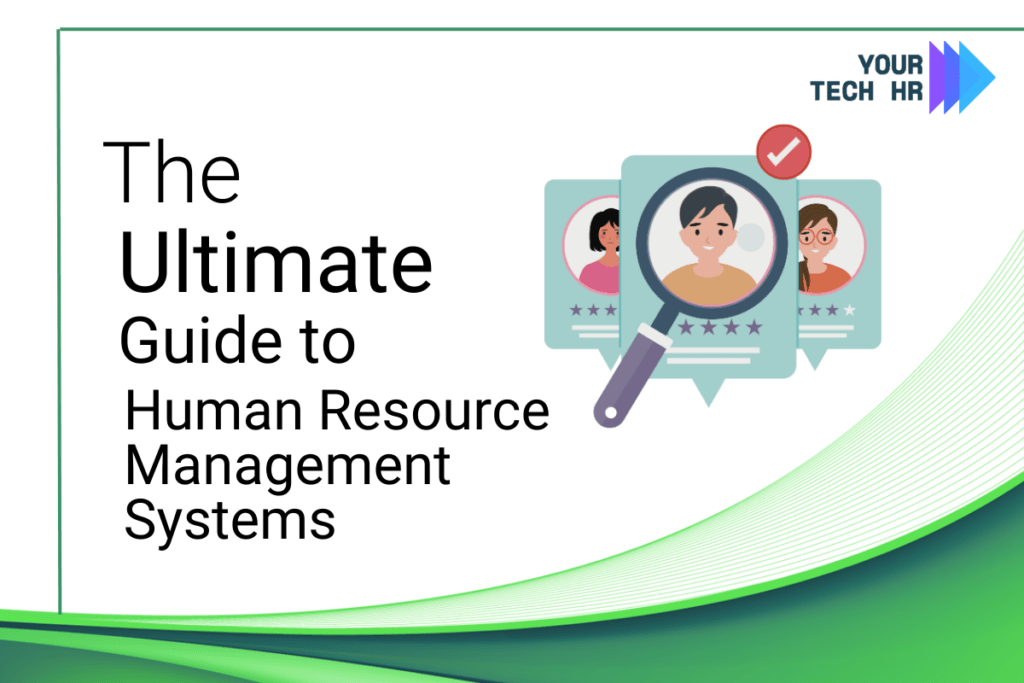Table of Contents
- What is an HRMS?
- Why is an HRMS Required?
- Are There Any Differences Between HRIS, HRMS, or HCM?
- Modules of HRMS or How HRMS Works
- Key Features of HRMS
- Benefits of Implementing HRMS
- Key Benefits of HRMS for Various Stakeholders
- Choosing the Right HRMS
- How to Implement an HRMS
- Top HRMS Solutions in 2024
In today’s fast-paced business world, keeping your workforce happy and productive is essential for success. That’s where Human Resource Management Systems (HRMS) come in. HRMS are like powerful tools that help companies manage all aspects of their people, from finding new talent to paying salaries, tracking performance, and even boosting employee engagement. But what exactly are these systems, and how can they make your business run smoother?
Are you ready to optimize your HR processes and boost employee engagement? Let’s dive into the ultimate guide to Human Resource Management Systems (HRMS) and explore how they can revolutionize your business.
What is an HRMS?
Human Resource Management Systems (HRMS) are integrated software solutions designed to manage and automate various HR functions. These systems combine HR software, HRIS (Human Resource Information System), payroll management, talent management, and employee performance management into a single platform, making it easier for HR departments to handle their tasks efficiently.
Why is an HRMS Required?
Implementing an HRMS is essential for streamlining HR processes, enhancing data accuracy, and improving overall efficiency. Here are some key reasons why an HRMS is required:
- Efficiency: Automates routine HR tasks, reducing administrative burden.
- Accuracy: Minimizes errors in payroll and employee data management.
- Compliance: Ensures adherence to labor laws and regulations.
- Employee Engagement: Enhances employee experience through self-service portals and streamlined processes.
Are There Any Differences Between HRIS, HRMS, or HCM?
While HRIS (Human Resource Information System), HRMS, and HCM (Human Capital Management) are often used interchangeably, they have distinct differences:
- HRIS: Focuses on basic HR functions such as payroll and employee data management.
- HRMS: Offers a broader range of HR functionalities including talent management and performance tracking.
- HCM: Encompasses a strategic approach to managing human capital, including workforce planning and analytics.
Modules of HRMS or How HRMS Works
HRMS typically includes various modules that cover the entire employee lifecycle:
- Employee Information Management: Centralized database for employee records.
- Payroll Management: Automated payroll processing and compliance.
- Talent Management: Recruitment, onboarding, and performance management.
- Learning and Development: Training programs and career development.
- Employee Self-Service: Portals for employees to manage their information.
Key Features of HRMS
- HR Software
HR software forms the backbone of any HRMS, offering modules for recruitment, employee data management, attendance tracking, and more. It ensures seamless HR operations by providing a centralized database for all employee information.
- HRIS (Human Resource Information System)
HRIS is a crucial component of HRMS, focusing on data entry, data tracking, and data management. It helps in maintaining accurate employee records, generating reports, and ensuring compliance with labor laws.
- Payroll Management
Payroll management within HRMS automates the entire payroll process, from calculating salaries to managing tax deductions. This feature ensures timely and accurate payroll processing, reducing errors and saving time.
- Talent Management
Talent management modules in HRMS help in recruiting, onboarding, training, and retaining top talent. They offer tools for talent acquisition, performance appraisals, succession planning, and career development.
- Employee Performance Management
Employee performance management features allow organizations to set performance goals, conduct evaluations, and provide feedback. This helps in identifying high performers and addressing performance issues promptly.
Benefits of Implementing HRMS
Implementing an HRMS offers numerous benefits that can significantly improve HR operations and overall business performance.
- Improved Efficiency
HRMS automates repetitive HR tasks, freeing up HR professionals to focus on strategic activities. This improves overall efficiency and productivity.
- Enhanced Employee Engagement
With self-service portals, employees can access their information, request leave, and manage their benefits, leading to higher engagement and satisfaction.
- Accurate Data Management
HRMS ensures accurate data management by reducing manual errors and providing real-time updates. This helps in making informed decisions based on reliable data.
- Cost Savings
By automating HR processes, HRMS reduces administrative costs and minimizes the need for paper-based systems. This results in significant cost savings for the organization.
- Better Compliance
HRMS helps in maintaining compliance with labor laws and regulations by providing timely updates and generating accurate reports. This reduces the risk of legal issues and penalties.
Key Benefits of HRMS for Various Stakeholders
- For HR Professionals:
Streamlines HR processes and improves efficiency.
Reduces administrative workload and errors.
- For Managers:
Enhances talent management and performance tracking.
Facilitates better decision-making with data-driven insights.
- For Employees:
Improves access to HR services and self-service options.
Increases engagement and satisfaction through transparent performance management.
- For Executives:
Provides comprehensive analytics for strategic planning.
Enhances compliance and reduces risk.
Choosing the Right HRMS
Choosing the right HRMS is crucial for reaping its benefits. Here are some factors to consider:
- Assess Your Needs
Identify the specific HR needs of your organization, such as payroll management, talent acquisition, or performance management. This will help you choose an HRMS that aligns with your requirements.
- Evaluate Features
Compare the features of different HRMS solutions to find one that offers the functionalities you need. Look for customizable modules, user-friendly interfaces, and robust reporting capabilities.
- Consider Scalability
Choose an HRMS that can scale with your business as it grows. This ensures that the system can handle increased data and additional users without compromising performance.
- Check Integration Capabilities
Ensure that the HRMS can integrate with other software systems used in your organization, such as ERP or CRM systems. This facilitates seamless data flow and enhances overall efficiency.
- Review Vendor Support
Evaluate the support services provided by the HRMS vendor. Look for comprehensive training programs, responsive customer support, and regular software updates.
How to Implement an HRMS
Implementing an HRMS involves several steps to ensure a smooth transition and maximize its benefits.
- Plan and Prepare
Develop a detailed implementation plan that outlines the goals, timelines, and resources required. Assign a dedicated project team to oversee the implementation process.
- Data Migration
Ensure accurate data migration from existing systems to the new HRMS. Clean and validate the data to avoid any discrepancies during the transition.
- Customize and Configure
Customize the HRMS to suit your organization’s specific needs. Configure the system settings, user roles, and access permissions to ensure smooth operation.
- Train Employees
Conduct comprehensive training sessions for HR staff and employees to familiarize them with the new system. Provide ongoing support to address any queries or issues.
- Monitor and Evaluate
Continuously monitor the performance of the HRMS and gather feedback from users. Evaluate the system’s impact on HR operations and make necessary adjustments to optimize its performance.
Top HRMS Solutions in 2024
Here are some of the top HRMS solutions in 2024 that offer advanced features and functionalities:
- Workday
- Workday is known for its robust HR and financial management capabilities. It offers comprehensive HR modules, including payroll, talent management, and workforce planning.
- SAP SuccessFactors
- SAP SuccessFactors provides a complete suite of HR solutions, including core HR, payroll, and talent management. It is highly scalable and suitable for businesses of all sizes.
- Oracle HCM Cloud
- Oracle HCM Cloud offers a wide range of HR modules, such as HRIS, payroll, and performance management. It is known for its flexibility and integration capabilities.
- BambooHR
- BambooHR is a user-friendly HRMS designed for small and medium-sized businesses. It offers features like employee self-service, applicant tracking, and performance management.
- ADP Workforce Now
- ADP Workforce Now is a comprehensive HRMS that includes payroll, time and attendance, and benefits administration. It is suitable for businesses of all sizes and offers excellent customer support.
Difference Between On-premises and Cloud-based HRMS Software
Choosing between on-premises and cloud-based HRMS depends on your organization’s needs:
- On-premises HRMS: Installed locally on company servers, offering greater control and customization.
- Cloud-based HRMS: Hosted on the vendor’s servers, providing scalability, accessibility, and lower upfront costs.
- Current and Future Trends in HRMS Software
Staying updated with the latest trends in HRMS can give your business a competitive edge:
- AI and Machine Learning: Automating recruitment and performance management.
- Mobile Accessibility: Allowing employees to access HR services on the go.
- HR Analytics: Leveraging data to make informed HR decisions.
- Employee Engagement Tools: Enhancing communication and engagement.
Mastering HR management is essential for driving business growth and innovation. By leveraging advanced HRMS solutions, organizations can streamline HR operations, enhance employee engagement, and make data-driven decisions. Whether you’re looking to improve payroll management, talent acquisition, or employee performance, the right HRMS can transform your HR strategy.
Ready to take your HR operations to the next level? Contact YourTechHR now to explore how our HRMS solutions can empower your business and drive success.
Don’t wait, take the next step towards efficient and innovative HR management now!
FAQ’s
A1: Yes, Modern HRMS solutions offer integration capabilities with payroll systems, accounting software, and project management tools, ensuring seamless data flow and reducing manual data entry. It’s crucial to check the integration options and compatibility of an HRMS with your existing software stack for optimal results.
Q2: Is an HRMS suitable for small businesses?
A2: An HRMS is suitable for small businesses as it helps manage HR tasks efficiently, maintain compliance, and support growth. Many HRMS solutions are designed for small and medium-sized enterprises, offering scalable options that allow for additional features as the business expands.
Q3: How secure is an HRMS?
A3: HRMS providers prioritize security through advanced encryption, regular updates, and data protection regulations. When evaluating an HRMS, inquire about its security measures, data backup protocols, and compliance with standards like GDPR or CCPA to ensure data protection.
Q4: How long does it take to implement an HRMS?
A4: The implementation time for an HRMS can vary depending on the complexity of your HR processes and the chosen system, ranging from a few weeks to several months. A good HRMS provider will provide a detailed implementation plan, including data migration, system configuration, user training, and support for a smooth transition.
Q5: Will an HRMS replace our HR team?
A5: An HRMS is not meant to replace the HR team, but rather to enhance their capabilities by automating repetitive tasks and providing valuable insights, allowing HR professionals to focus on strategic initiatives, employee engagement, and other high-value activities that require human touch.
Q6: What kind of support can we expect from an HRMS provider?
A6: An HRMS provider typically provides comprehensive support, including initial setup assistance, HR team training, ongoing technical support, and regular system updates. It is recommended to choose providers with multiple support channels like phone, email, live chat, and extensive knowledge base to ensure prompt assistance.


